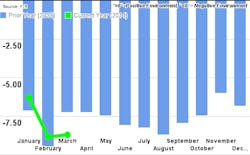For shippers, any conversation about moving goods pretty much starts and ends with “capacity”: Are there trucks available, and how much is it going to cost to have my freight moved? Based on the latest readings from transportation analyst firm FTR, capacity is very tight right now and it’s not going to get a whole lot better any time soon.
According to FTR’s Shippers Conditions Index (SCI), the current level of capacity stands at -8.7. Now, that’s a very, very modest improvement from the -8.8 reading from the previous month, but the fact that the needle barely budged from month to month is pretty much bad news. FTR says the tight capacity will moderate slightly in the coming months. If the economy improves this summer, well… that’s not necessarily good news either, because as FTR sees it, if freight volumes increase significantly, capacity could reach a critical stage that would force shippers to incur additional transportation costs.”
“Shippers learned that it doesn’t take much for a market that is operating with slim excess capacity to jump into the driver’s seat for rate increases,” explains Jonathan Starks, FTR’s director of transportation analysis. “The strong spot market rate increases seen during January, February and March highlighted how quickly the environment can change on them. Just one year ago, several industry sources were showing that general rate increases were actually below year-ago levels; shippers were getting rate reductions. A fairly static economy allowed that to take place, but the introduction of new Hours-of-Service (HOS) rules for drivers back in July 2013 changed that. Add in the potential for further economic acceleration in 2014 and we find it very unlikely that shippers will be able to get the rate reductions that they achieved last year.”
Starks expects to see general rate increases of between 4%-5% for the year for truckload carriers, and national rate figures could hit 6% or even higher.




